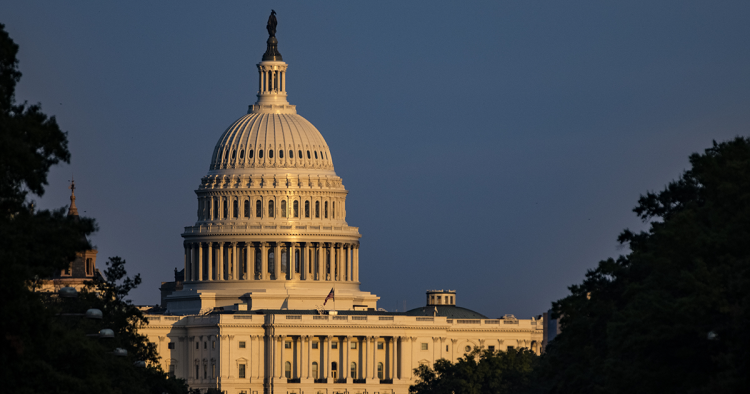This piece is part of an ongoing series on U.S. congressional legislation focused on the Middle East and North Africa (MENA) region.
Introduction
Congress introduced less legislation targeting the MENA region during the third quarter of 2021 than in previous quarters this year. Yet, it made incremental progress on must-pass legislation and expressed strong interest in Afghanistan during this period, due to the American troop withdrawal following nearly 20 years of operations. The most significant and relevant measures that Congress undertook during this timeframe were the House of Representatives passing the: (1) Department of State, Foreign Operations, and Related Programs Appropriations Act, 2022 (SFOPS); (2) National Defense Authorization Act for Fiscal Year 2022 (NDAA); (3) Speaker Nancy Pelosi-led resolution commemorating the 20th anniversary of 9/11; (4) Iron Dome Supplemental Appropriations Act, 2022; and (5) Libya Stabilization Act. In contrast, the Senate failed to pass equivalent appropriations or NDAA legislation, even though it approved a resolution declaring September 11 through September 17 as “Patriot Week.” No major MENA-targeted legislation became law during this timeframe.
This article chronicles select congressional action concerning the MENA region during the third quarter of 2021. Its scope is limited to hearings and legislation targeting or substantially impacting at least one MENA country for which the congressional committees with jurisdiction over foreign affairs, appropriations, and defense exercised their authorities. For the purposes of this article, MENA is defined as the area including North Africa, the Levant, Turkey, the Gulf, Yemen, and Iran. However, this article departs from previous updates by including a separate section on Afghanistan due to that country’s interconnectedness with the MENA region and renewed political relevance.
House of Representatives
1. Hearings
The House Foreign Affairs Committee (HFAC) did not hold any full committee hearings directly focused upon the MENA region during the third quarter. However, it held a July hearing featuring U.S. Agency for International Development (USAID) Administrator Samantha Power concerning USAID’s FY’22 Budget Request, which would have a substantial effect upon the MENA region. In contrast, HFAC’s Subcommittee on the Middle East, North Africa, and Global Counterterrorism held hearings concerning peacebuilding efforts between Israelis and Palestinians as well as American policy regarding Lebanon. The House Appropriations Committee (HAC) did not hold any hearings focused upon the MENA region this quarter, nor did its subcommittees. Similarly, neither the House Armed Services Committee (HASC) nor its subcommittees held hearings targeting the MENA region during this timeframe, although they held multiple hearings concerning the NDAA.
2. Legislation Introduced
During the third quarter of the year, 1,386 bills were introduced in the House of Representatives. Of these, 118 were referred to HFAC in at least some capacity, constituting 8.5% of all bills introduced in the House during this timeframe. Among the bills referred to HFAC, 13 concerned MENA, constituting 11% of all foreign affairs legislation and 0.9% of all legislation introduced in the House during this timeframe. These MENA-targeted bills largely focused upon Israel, the Palestinian Territories, Turkey, and Lebanon. Significantly, the (1) Emergency Supplemental Appropriations Resolution, 2021; (2) National Defense Authorization Act for Fiscal Year 2022; (3) Department of State, Foreign Operations, and Related Programs Appropriations Act, 2022; and (4) Department of Defense Appropriations Act, 2022 were all introduced during this timeframe, although not included in the charts below, which only quantify HFAC legislation in context.[i]
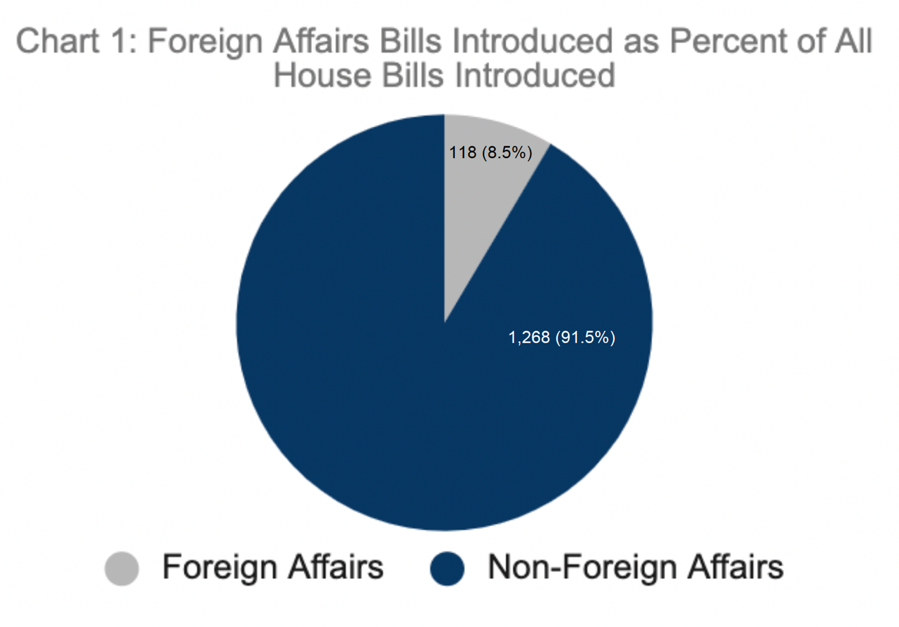
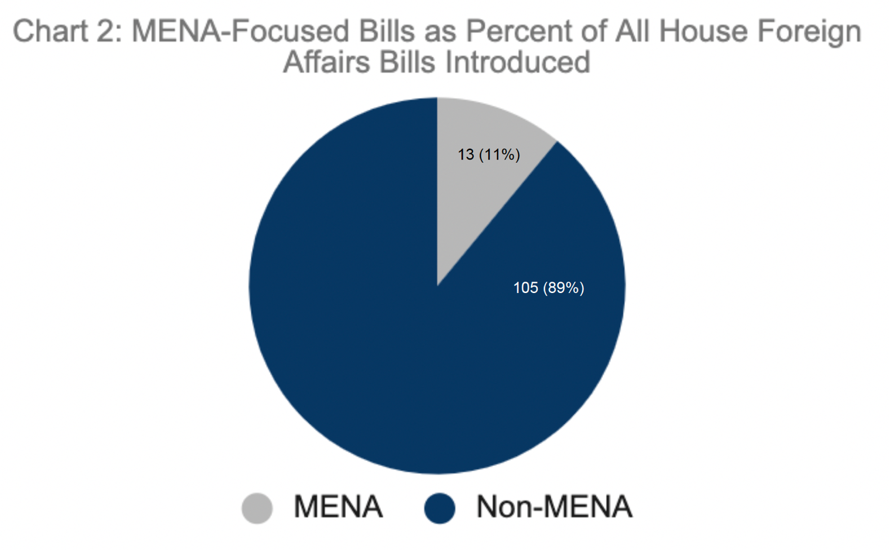
A complete table of MENA-targeted legislation introduced during this timeframe that were referred to HFAC, in whole or in part, can be found here.
3. Legislative Action
HFAC held two markups between July and September, inclusive, which considered MENA-targeted legislation. The July markup approved Congressman David Cicilline’s H.Res.497 “Condemning the murder of Alireza Fazeli Monfared and the practice of so-called ‘honor killings’ in Iran, and for other purposes” without adopting Congressman Ronny Jackson’s amendment. In contrast, Congresswoman Nicole Malliotakis’ H.Res.376 “Condemning Turkey for its illegal occupation of Cyprus and encouraging President Biden to make the resolution of the Cyprus problem a top foreign policy priority” was scheduled to be considered during the markup, and even re-introduced as an amendment in the nature of a substitute, although it did not advance beyond the markup. The September markup approved Congressman Brad Schneider’s Israel Relations Normalization Act of 2021, as amended by Congressman Brian Mast and Congresswoman Sara Jacobs, while rejecting two amendments from Congressman Scott Perry.[ii]
HAC held two markups during this timeframe. The first markup approved the FY’22 State, Foreign Operations, and Related Programs (SFOPS) funding bill, which would have a substantial impact upon the MENA region. The second markup approved the Department of Defense Appropriations Act, 2022, as amended twice by Congresswoman Barbara Lee. The approved version of the bill would have a substantial impact upon the MENA region, which includes limiting American involvement in Yemen and ending both the 2001 and 2002 authorizations for the use of military force. HASC held a full committee markup of the 2022 NDAA in September, which followed several subcommittee markups. The final NDAA contained numerous provisions impacting the MENA region.
During this timeframe, the House of Representatives approved the following five bills directly targeting or substantially impacting the MENA region: (1) Department of State, Foreign Operations, and Related Programs Appropriations Act, 2022 (passed 217-212); (2) National Defense Authorization Act for Fiscal Year 2022 (passed 316-113); (3) Speaker Nancy Pelosi-led resolution commemorating the 20th anniversary of 9/11 (without objection); (4) Iron Dome Supplemental Appropriations Act, 2022 (passed 420-9); and (5) Libya Stabilization Act (passed 386-35). The House’s approach to passing a continuing resolution without Iron Dome funding, followed by a separate Iron Dome funding bill raised controversy and elicited an alternative Iron Dome funding proposal from Congressman Chris Jacobs. Although not MENA-focused, the House budget resolution adopting the Senate budget resolution contained the same MENA-related provisions by reference.
Senate
1. Hearings
The Senate Foreign Relations Committee (SFRC) held four full committee hearings targeting or substantially impacting the MENA region during this timeframe. The first was a closed July hearing on Senator Tim Kaine’s S.J.Res.10, which would repeal the 1991 and 2002 authorizations for the use of military force. The second was a review of the FY’22 USAID budget request, featuring testimony from USAID Administrator Samantha Power concerning this bill, which would have a substantial impact on the Middle East. The third was a hearing concerning U.S. policy on Turkey, with testimony from Under Secretary of State for Political Affairs Victoria Nuland. The fourth was an August hearing focused upon authorizations for the use of force, featuring testimony from Deputy Secretary of State Wendy Sherman, Department of State Acting Legal Advisor Richard Visek, and Department of Defense General Counsel Caroline Krass. SFRC’s Subcommittee on Near East, South Asia, Central Asia, and Counterterrorism furthermore held an August hearing on U.S. security assistance in the Middle East.
The Senate also received dozens of nominations during this timeframe. The following six are most relevant to the MENA region: (1) former Ambassador to Croatia Julieta Noyes to serve as Assistant Secretary of State for Population, Refugees, and Migration; (2) former Senator Jeff Flake to serve as Ambassador to Turkey; (3) former Deputy Secretary of State for Management and Resources Thomas Nides to serve as Ambassador to Israel; (4) Tamara Cofman Wittes, a Middle East expert, to serve as Assistant Administrator for USAID; (5) former Special Envoy for Strategic Counterterrorism Communications Rashad Hussain to serve as Ambassador at Large for International Religious Freedom; and (6) Professor Deborah Lipstadt to serve as Special Envoy to Monitor and Combat Anti-Semitism.
Ambassador Noyes received a nomination hearing in mid-September along with the Honorable Barbara Leaf, who previously served as Ambassador to the United Arab Emirates and was nominated to serve as Assistant Secretary of State for Near Eastern Affairs. However, none of the nominees mentioned in this section were voted out of committee during this timeframe. No other committees were surveyed for the purposes of nominations.
Neither the Senate Appropriations Committee (SAC), nor the Senate Armed Services Committee (SASC) held hearings directly targeting the MENA region during this timeframe, although the Senate Homeland Security and Government Affairs Committee (HSGAC) held an August hearing examining the threat of racially, ethnically, and religiously motivated attacks. No other committees were surveyed for this section.
2. Legislation Introduced
During the third quarter of the year, 735 bills were introduced in the Senate. Of these, 52 were referred to SFRC in at least some capacity, constituting 7.1% of all legislation introduced in the Senate during this timeframe. Among the bills referred to SFRC, 13 concerned MENA, in whole or in part, constituting 25% of all foreign affairs legislation and 1.8% of all legislation introduced in the Senate during this timeframe. Nearly half of these MENA-targeted SFRC bills focused upon Israel and Lebanon alone.
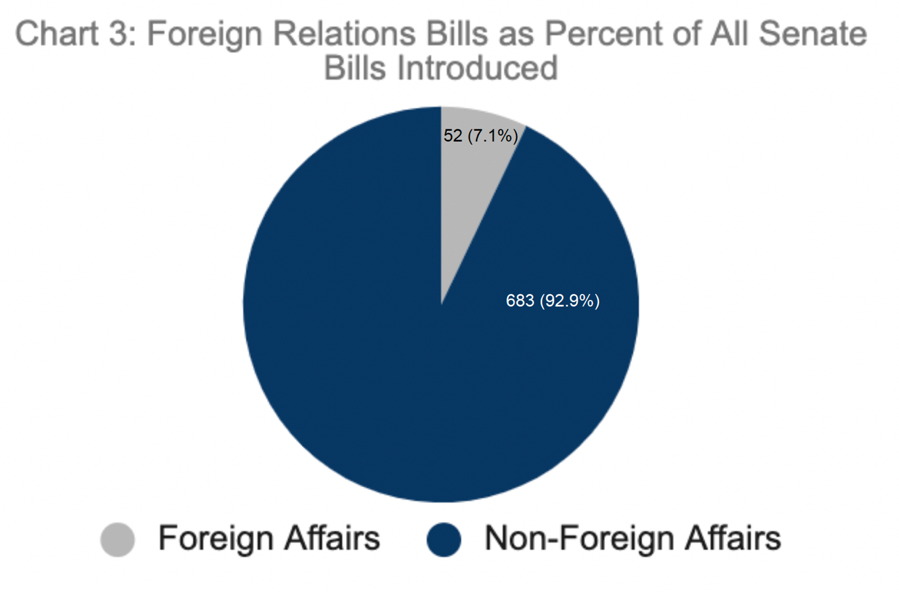
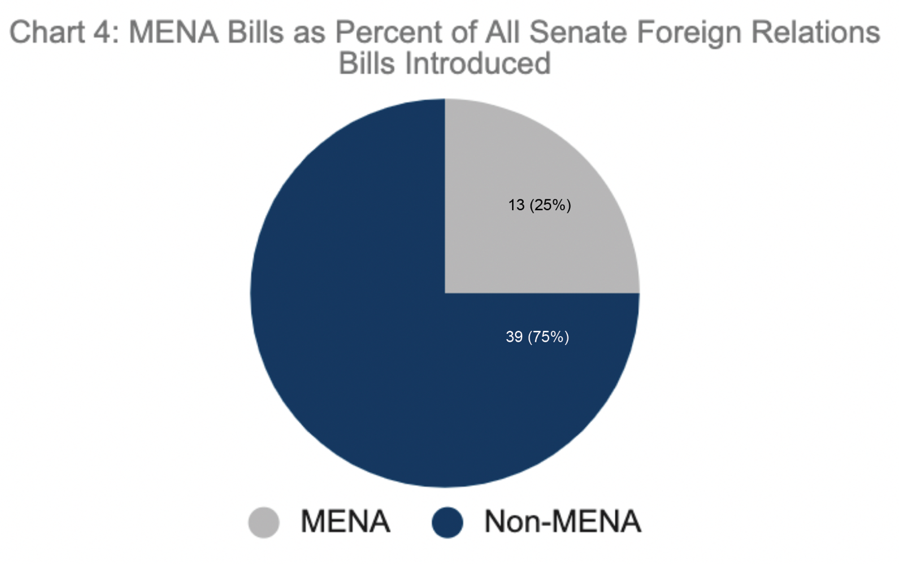
A complete table of MENA-targeted legislation introduced during this timeframe that were referred to SFRC, in whole or in part, can be found here.
Outside of SFRC, a number of bills were introduced targeting or substantially impacting the MENA region. These included: (1) Senator Tom Cotton’s Anti-BDS Labeling Act; (2) Senator Marco Rubio’s GIFTS in Higher Education Act; (3) Senator Alex Padilla’s Iran Hostages Congressional Gold Medal Act; (4) Senator Richard Shelby’s Extending Government Funding and Delivering Emergency Assistance Act; and (5) Senator Marco Rubio’s Mind Your Own Business Act. Notably, Senator Jack Reed introduced the Senate’s FY’22 National Defense Authorization Act, which would have a substantial impact upon the MENA region. However, only Senator Shelby’s and Senator Reed’s bills advanced beyond the committee level during the specified timeframe.
3. Legislative Action
SFRC held one business meeting addressing MENA-targeted legislation. During that meeting, the Committee advanced Senator Tim Kaine’s S.J.Res.10 “A joint resolution to repeal the authorizations for use of military force against Iraq, and for other purposes.” SAC held no markups of direct relevance to the MENA region during this timeframe. In contrast, SASC passed its FY’22 National Defense Authorization Act, which would have a substantial impact upon the MENA region.
Yet, the only MENA-relevant legislation that passed the Senate during this timeframe was Senator Gary Peters’ S.Res.366 “A resolution expressing support for the designation of the week of September 11 through September 17 as ‘Patriot Week’” (passed by unanimous consent). The Senate-led budget resolution contained some MENA-related provisions, although it was a far more general bill.
Afghanistan
Although not located within the MENA region, the American withdrawal from Afghanistan refocused policy attention back on that country, impacting American policy toward the MENA region. For this reason, congressional action pertaining to Afghanistan is included as a supplemental section to this update.
1. Hearings
HFAC held a hearing on Afghanistan featuring testimony from U.S. Secretary of State Antony Blinken in addition to a joint closed briefing with the House Committee on Oversight and Reform (COR). HAC did not hold any hearings focused upon Afghanistan during this timeframe. In contrast, HASC held a hearing featuring testimony from Secretary of Defense Lloyd Austin, Chairman of the Joint Chiefs of Staff Mark Milley, and Commander of Central Command Gen. Kenneth McKenzie, Jr. No other committees were surveyed for this section.
SFRC also held a hearing on Afghanistan featuring testimony from U.S. Secretary of State Antony Blinken. Meanwhile, SAC did not hold any hearings focused upon Afghanistan during this timeframe. In contrast, SASC held two hearings and a briefing concerning Afghanistan. The first SASC hearing notably featured testimony from Secretary of Defense Lloyd Austin and Chairman of the Joint Chiefs of Staff Mark Milley. No other committees were surveyed for this section.
2. Legislation Introduced
During the third quarter of the year, 29 bills were introduced in the House concerning Afghanistan with referrals in whole or in part to HFAC. This constituted a whopping 24.6% of all House foreign affairs bills introduced during this timeframe. In contrast, six bills were introduced in the Senate concerning Afghanistan with referrals in whole or in part to SFRC. This constituted 11.5% of all Senate foreign relations bills introduced during this timeframe. No other committees were surveyed for the purposes of assessing recently introduced legislation, although the aforementioned NDAA and appropriations bills would impact Afghanistan, in addition to the budget resolution.
3. Legislative Action
HFAC approved Congresswoman Kathy Manning’s amended H.Res.547 “Calling for the continued support of Afghan women and girls after the drawdown of American troops” by voice vote in late July. The committee also approved Congresswoman Claudia Tenney’s Flights for Freedom Act, to be reported in the nature of a substitute, by voice vote in late September. The House of Representatives as a chamber also passed Speaker Nancy Pelosi’s H.Res.626 “Expressing the sense of the House of Representatives regarding the terrorist attacks launched against the United States on September 11, 2001, on the 20th anniversary of that date” on Sept. 10.
No other House committees were surveyed for the purposes of assessing recently passed legislation, although the aforementioned NDAA and appropriations bills would impact Afghanistan, in addition to the budget resolution.
Neither SFRC nor SASC passed Afghanistan-focused legislation during this timeframe. In contrast, SAC passed its NDAA, which would have a substantial impact on Afghanistan. The Senate as a chamber also passed Senator Gary Peters’ S.Res.366 “A resolution expressing support for the designation of the week of September 11 through September 17 as ‘Patriot Week,’” which is of some relevance to Afghanistan.
Conclusion
Congress as a whole failed to pass significant MENA-related legislation between July and September of this year. However, the House of Representatives made great strides by approving State Department funding, an NDAA proposal, a 9/11 resolution led by Speaker Nancy Pelosi, Iron Dome funding for Israel, and legislation to stabilize Libya. House committees also approved additional legislation that has yet to be voted upon on the House Floor. In contrast, the Senate made less progress and only passed a partially-relevant commemorative resolution led by Senator Gary Peters concerning significant September events, including 9/11. Senate committees made some progress in approving legislation, including a budget resolution, but were outpaced by their counterparts in the House of Representatives. In general, Congress expressed its largest relevant interest during this timeframe in the withdrawal from Afghanistan, 9/11 anniversary, authorizations for the use of military force, Israel, and Lebanon.
Harry William Baumgarten previously served as Legislative Director and Counsel to Members of the House of Representatives. He holds Juris Doctor and Master of Public Policy degrees from Georgetown University and a Bachelor of Arts degree from the Elliott School of International Affairs at the George Washington University. The views expressed in this piece are his own.
Photo by Samuel Corum/Bloomberg via Getty Images
Endnotes
[i] Congresswoman Ilhan Omar’s Stop Arming Human Rights Abusers Act and Congressman Brad Sherman’s Secure American Foreign Evacuations Act would each impact the MENA region, although neither bill specifically targets the region.
[ii] HFAC also held two markups approving Chairman Meeks’ EAGLE Act, which would have some effect on the Middle East and North Africa.
The Middle East Institute (MEI) is an independent, non-partisan, non-for-profit, educational organization. It does not engage in advocacy and its scholars’ opinions are their own. MEI welcomes financial donations, but retains sole editorial control over its work and its publications reflect only the authors’ views. For a listing of MEI donors, please click here.













